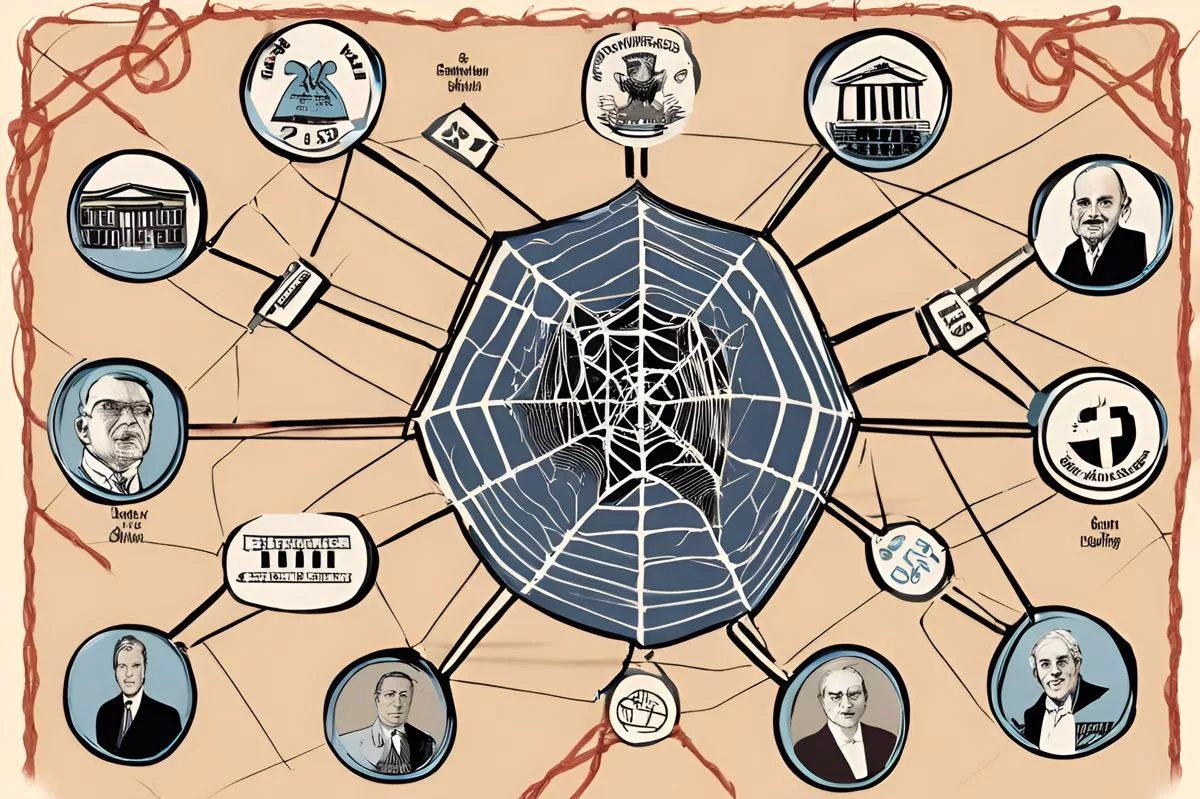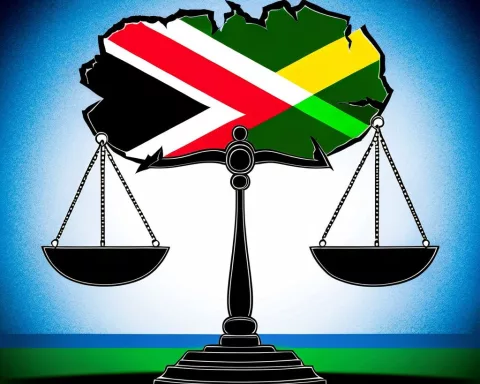The Economic Freedom Fighters (EFF) are raising serious questions about Agriculture Minister John Steenhuisen’s hiring choices, claiming he brought in people who aren’t qualified for their jobs. This situation has sparked a larger conversation about honesty and responsibility in South African politics. The EFF is pushing for a closer look at Steenhuisen’s actions, especially after a controversial appointment of a divisive figure as his chief of staff. As this drama unfolds, it highlights the ongoing struggle for ethical leadership in government and the importance of holding leaders accountable for their decisions.
What is the EFF’s Challenge to Minister Steenhuisen?
The Economic Freedom Fighters (EFF) have challenged Agriculture Minister John Steenhuisen’s hiring practices, alleging he appointed unqualified individuals. This controversy raises concerns about transparency and ethical governance, reflecting broader issues of accountability within South African politics.
The EFF’s Bold Move for Accountability
In the intricate arena of South African politics, the Economic Freedom Fighters (EFF) have once again positioned themselves as a formidable force. Their recent decision to bring Agriculture Minister John Steenhuisen under the scrutiny of the ethics committee highlights their relentless pursuit of accountability and transparency. At the heart of this controversy lies the accusation that Steenhuisen employed individuals who lacked the necessary qualifications, sparking a wider debate on the integrity of public officials.
At the core of the EFF’s accusations is Steenhuisen’s dual role as the Agriculture Minister and leader of the Democratic Alliance (DA). The EFF alleges that Steenhuisen circumvented standard hiring procedures to appoint four individuals who fell short of the required educational and experiential standards. This claim starkly contrasts with Steenhuisen’s statements in Parliament, where he seemingly dismissed any breach of hiring protocols. However, revelations from the minister of public service and administration suggest otherwise, with a letter from Steenhuisen requesting an exemption for these appointments coming to light.
The unfolding scandal paints a troubling picture of a leader that the EFF believes fails to uphold transparency and legal standards. They argue that Steenhuisen’s actions reflect a broader issue of ethical decay within the government, which they claim undermines the operational efficiency of his department. The Public Services Act, which mandates minimum qualifications for government roles, appears to be at the center of this contentious debate.
A Controversial Appointment Ignites Further Debate
Adding another layer of complexity to Steenhuisen’s situation is the contentious appointment of Roman Cabanac as chief of staff. Known for his divisive podcasting ventures and allegations of racism, Cabanac’s selection has drawn significant criticism. The EFF argues that his presence in such a critical position exacerbates the dysfunction they attribute to Steenhuisen’s leadership.
Cabanac’s refusal to resign, despite Steenhuisen’s public calls for his departure, has intensified the scrutiny surrounding the minister’s office. Reports from the Daily Maverick reveal a dramatic standoff, as Steenhuisen’s comments at the Cape Town Press Club acknowledge the distraction caused by the controversy. His reference to human fallibility and the necessity of corrective measures adds another layer to the narrative, prompting questions about leadership, accountability, and decision-making in political appointments.
The Cabanac affair embodies broader political themes: the challenge of maintaining idealism in governance and the ongoing struggle for ethical leadership. Historical examples, such as the Renaissance patronage systems, highlight the perpetual tension between meritocracy and favoritism. Today, these issues impact governmental efficiency and public trust, underscoring the stakes involved in political appointments.
The Broader Implications for Political Leadership
This unfolding saga draws attention to the complexities inherent in internal party politics, particularly within the Democratic Alliance. Steenhuisen’s roles as both party leader and minister require adept political maneuvering and an unwavering commitment to ethical principles. History is replete with leaders who have stumbled under similar pressures, where the quest for power often clashes with ethical responsibilities.
In literature, the archetype of the flawed leader serves as a poignant reminder of human imperfection. From Shakespearean tragedies to modern political thrillers, these narratives delve into the consequences of decisions made under the weight of power. They resonate with audiences by mirroring societal realities, where leaders must navigate the turbulent waters of responsibility, integrity, and pragmatism.
The drama surrounding Minister Steenhuisen and his controversial appointments encapsulates these timeless narratives. It offers a microcosm of the broader challenges faced by political systems globally, where ideals frequently conflict with the harsh realities of governance. Stakeholders must engage with these complexities, seeking to balance effective leadership with ethical imperatives.
A Tapestry Woven with Controversy and Accountability
In the vibrant tapestry of South African politics, this episode introduces a new thread, rich with controversy and the quest for accountability. The actions of the EFF, Steenhuisen’s counter-responses, and the public’s reaction collectively depict a political landscape in transition. As this story unfolds, it serves as a stark reminder of the intricate dance between power and principle, a dance that continues to shape the dimensions of public life.
The EFF’s challenge to Steenhuisen underscores the enduring tension between power and ethics in governance. It reflects the ongoing struggle to reconcile the demands of political leadership with the imperatives of transparency and accountability. As observers watch this narrative evolve, the episode offers valuable insights into the complex dynamics that define political landscapes and the relentless pursuit of ethical governance.
FAQ on EFF’s Challenge to Minister Steenhuisen
What are the main allegations made by the EFF against Minister Steenhuisen?
The Economic Freedom Fighters (EFF) allege that Agriculture Minister John Steenhuisen appointed unqualified individuals to key positions within his department. This has raised significant concerns regarding transparency and ethical governance in South African politics.
Why is the EFF focusing on Steenhuisen’s hiring practices?
The EFF is scrutinizing Steenhuisen’s hiring practices because they believe he circumvented standard hiring procedures to employ individuals who do not meet the necessary educational and experiential qualifications. This situation reflects broader issues of accountability and integrity within the government.
Who is Roman Cabanac and why is his appointment controversial?
Roman Cabanac has been appointed as Steenhuisen’s chief of staff, and his selection has sparked controversy due to his divisive podcasting history and allegations of racism. The EFF argues that Cabanac’s presence exacerbates dysfunction within the minister’s office, further questioning Steenhuisen’s leadership.
How has Minister Steenhuisen responded to the criticisms?
Steenhuisen has publicly addressed the controversy, acknowledging the distractions caused by the situation while emphasizing the need for corrective measures. However, his comments have been met with skepticism, particularly regarding his management of hiring protocols and the challenges posed by Cabanac’s controversial background.
What does this situation reveal about political accountability in South Africa?
This unfolding saga highlights the ongoing struggle for ethical leadership and accountability in South African politics. It underscores the need for leaders to adhere to transparency and legal standards, reflecting the broader societal demand for responsible governance.
What are the broader implications of this controversy for the Democratic Alliance?
The controversy surrounding Minister Steenhuisen and his hiring practices may impact the Democratic Alliance’s internal dynamics and public perception. As both the party leader and minister, Steenhuisen must navigate complex political pressures while maintaining ethical standards, which are crucial for the party’s credibility and effectiveness in governance.












